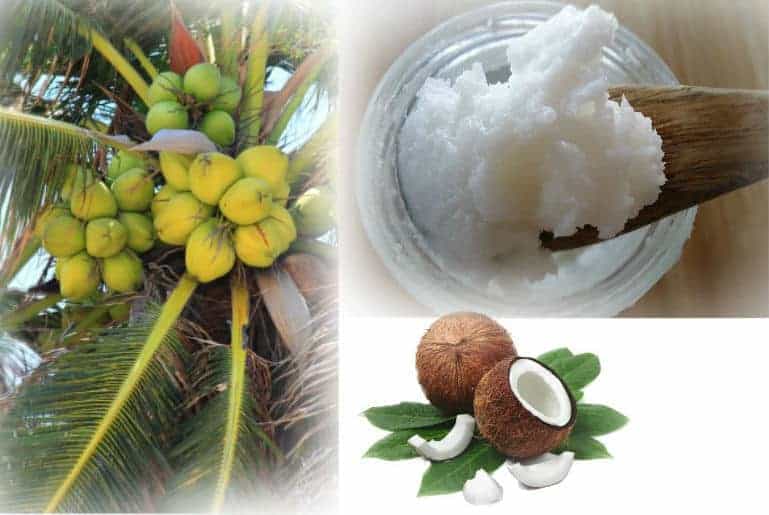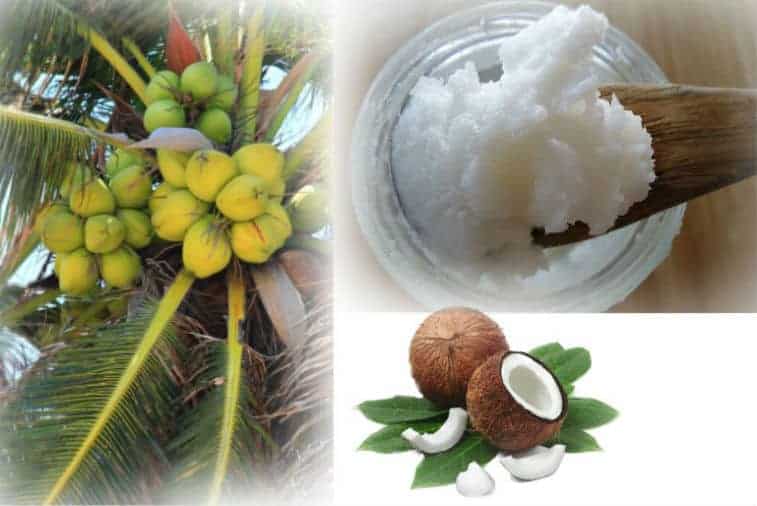Coconut Oil 101
We all know that there is no such thing as an “All-in-one” solution when it comes to our health. But it’s great when we come across a product that may address more of our needs at once to help us gain and maintain optimal health. You may find coconut oil to be a good fit. It’s a rich source that can easily be incorporated into your busy life, and may provide a wide variety of benefits to add to your health arsenal.
Did You Know?
Coconut oil has been used in many countries for centuries. Though it has grown in popularity these days, researchers in the United States have been studying its structure and benefits since the early 1920s. Coconut oil got a bad rap for a while but has come back in stride as more people become educated about it. It was once thought to be unhealthy in the U.S. during the 80’s. Several domestic food organizations launched an anti-saturated fat campaign that claimed it contributed to heart disease due to its saturated fat content, and linked it to trans fat, an unhealthy fat.
Why Did That Happen?
The claim was based on the results of a researcher who used fully hydrogenated virgin coconut oil on mice which increased the level of cholesterol. Misinformation about coconut oil spread like wild fire. The campaign was successful in minimizing the usage of imported oils. Meanwhile, domestic oils were being promoted instead of the once preferred choices of U.S. food companies—palm and coconut oil. However in 1988, N.W. Istfan of Harvard University Medical School’s Nutrition Coordinating Center reported: “For the U.S. consumer, the use of coconut oil does not increase the role of heart disease.”Scientific evidence by other researchers also demonstrated that coconut and palm oil, unlike other saturated fats, are healthy fats with many benefits.
What is the difference?
You may be thinking, “But coconut oil is a saturated fat. Isn’t that bad for you?” Yes, coconut oil has a rich saturated fat content, but it’s not an unhealthy fat like trans fat. The fatty acids have a different molecular make up. Most people are familiar with the classification of fats as you read them on a food label: saturated, polyunsaturated, and monounsaturated. Fats are also classified by the size of the molecule and the length of the carbon chain that makes up the molecule. There are 3 types of saturated fats: short, medium, and long.
- Short fatty acids that have a carbon length of less than 6.
- Medium chain triglycerides (MCT), also known as medium chain fatty acids that have a carbon length of 6 to 12.
- Long chain fatty acids that have a carbon length of more than 12.
The body works longer and harder to breakdown long chain fatty acids such as margarine, animal fats, and canola oil. However, short and medium chain fatty acids such as butter and coconut oil are easier for the body to digest and convert to energy. Research implies that one of the reasons why plant-based coconut oil has such a positive effect on the body, is because it’s mostly composed of MCT and lauric acid.
Benefits
Thousands of studies have been conducted over the years. Studies suggest that coconut oil and its components may provide numerous health benefits such as the ones listed below and many more:
- Reduces inflammation
- MCT help the body efficiently metabolize fat
- Lowers the risk of atherosclerosis (hardening of the arteries)
- Reduces bad (LDL) cholesterol and increases good (HDL) cholesterol, which improves cholesterol ratio levels
- Helps to regulate blood sugar
- Supports thyroid function
- Improves calcium and magnesium absorption, which aids in the development of strong teeth and bones, and protects against osteoporosis
- Conditions and strengthens hair
- Kills various bacteria, fungi, yeast, and viruses
- Enhances digestion and absorption of a wide variety of nutrients, minerals, amino acids, vitamins such as A, B, D, E, and K
- Moisturizes skin and has anti-aging properties
- Helps to form a barrier on the skin to protect against infection when applied topically
- Strengthens the immune system
It’s my hope that this has helped you have a better understanding of coconut oil. I encourage you to research and learn more about this terrific food source. Here are additional links to research the studies of other benefits:
Enjoy healthy living through healthy choices!
*Disclaimer
These statements are for informational purposes only and have not been evaluated by the Food and Drug Administration. This information and these products are not intended to diagnose, treat, cure or prevent any disease. If you are pregnant, nursing, taking medication, or have a medical condition, consult your physician before using these products.
**References
- Image courtesy of Wiangya/ FreeDigitalPhotos.net
- Image courtesy of Pixomar/ FreeDigitalPhotos.net
- Doctoroz.com/ Coconut Oil Part 1 and Part 2
- Fife, N.D., Bruce. The Coconut Oil Miracle: Where is the Evidence? Article: coconutresearchcenter.org
- Hunter, Beatrice Trum. How a PR Campaign Led to Unhealthy Diets. Article: August 2003 issue of Consumers’ Research, vol. 86 no. 8.
- Pillow, PhD, Claudia. Difference between Short Chains & Long Chains Fats. Article: February 9, 2012 on Hailmerry.com
- Carandang, Emil V. MS, Technical Manager, Philippine Coconut Research and Development Foundation, inc. Coconut Oil: Uses and Issues on its Health and Nutraceutical Benefits. Article: coconutoil.com 2003
- Kabara, PhD, Jon J. Health Oils from the Tree of Life (Nutritional and Health Aspects of Coconut Oil)
- Enig, Ph.D., Mary G. A New Look at Coconut Oil—Health and Nutritional Benefits from Coconut Oil: An Important Functional Food for the 21st Century. Presented at the AVOC Lauric Oils Symposium, Ho Chi Min City, Vietnam, April 25, 1996
- Nevin KG, Rajamohan T. Beneficial effects of virgin coconut oil on lipid parameters and in vitro LDL oxidation. Clin Biochem. 2004 Sep;37(9):830-5.
- Arunima S, Rajamohan T. Virgin coconut oil improves hepatic lipid metabolism in rats—compared with copra oil, olive oil and sunflower oil. Indian J Exp Biol. 2012 Nov;50(11):802-9.
- Intahphuak S, Khonsung P, Panthong A. Anti-inflammatory, analgesic, and antipyretic activities of virgin coconut oil. harm Biol. 2010 Feb;48(2):151-7. doi: 10.3109/13880200903062614.
- Hayatullina Z, Muhammad N, Mohamed N, Soelaiman IN. Virgin coconut oil supplementation prevents bone loss in osteoporosis rat model. Evid Based Complement Alternat Med. 2012;2012:237236. Epub 2012 Sep 16.
- Assunção ML, Ferreira HS, dos Santos AF, Cabral CR Jr, Florêncio TM. Effects of dietary coconut oil on the biochemical and anthropometric profiles of women presenting abdominal obesity. Lipids. 2009 Jul;44(7):593-601. doi: 10.1007/s11745-009-3306-6. Epub 2009 May 13.
- Hainer V, Kunesová M, Stich V, Zák A, Parizková J. The role of oils containing triacylglycerols and medium-chain fatty acids in the dietary treatment of obesity. The effect on resting energy expenditure and serum lipids. Cas Lek Cesk. 1994 Jun 13;133(12):373-5.
- Tantibhedhyangkul P, Hashim SA. Medium-chain triglyceride feeding in premature infants: effects on calcium and magnesium absorption. Pediatrics. 1978 Apr;61(4):537-45.
- Jensen C, Buist NR, Wilson T. Absorption of individual fatty acids from long chain or medium chain triglycerides in very small infants. Am J Clin Nutr. 1986 May;43(5):745-51.
- Huang CB, Alimova Y, Myers TM, Ebersole JL. Short- and medium-chain fatty acids exhibit antimicrobial activity for oral microorganisms. Arch Oral Biol. 2011 Jul;56(7):650-4. doi: 10.1016/j.archoralbio.2011.01.011. Epub 2011 Feb 17.
- Petschow BW, Batema RP, Ford LL. Susceptibility of Helicobacter pylori to bactericidal properties of medium-chain monoglycerides and free fatty acids. Antimicrob Agents Chemother. 1996 Feb;40(2):302-6.
- Bergsson G, Arnfinnsson J, Steingrímsson O, Thormar H. In vitro killing of Candida albicans by fatty acids and monoglycerides. Antimicrob Agents Chemother. 2001 Nov;45(11):3209-12.
- Ogbolu DO, Oni AA, Daini OA, Oloko AP. In vitro antimicrobial properties of coconut oil on Candida species in Ibadan, Nigeria. J Med Food. 2007 Jun;10(2):384-7.
- Sheshala R, Ying LT, Hui LS, Barua A, Dua K. Development and Anti-microbial Potential of Topical Formulations Containing Cocos nucifera Linn. Antiinflamm Antiallergy Agents Med Chem. 2013 Jul 10;12(3):253-64.
- Ruetsch, S.B., Kamath, Y.K., Rele, Aarti S., and Mohile, R.B. Secondary ion mass spectrometric investigation of penetration of coconut and mineral oils into human hair fibers: Relevance to hair damage.J. Cosmet. Sci., 52, 169-184 (May/June 2001)
- Hierholzer, J.C. and Kabara J.J. (1982) In vitro effects on Monolaurin compounds on enveloped RNA and DNA viruses. Journal of Food Safety 1982;4:1-12. doi: 10.1111/j.1745-4565.1982.tb00429.x






